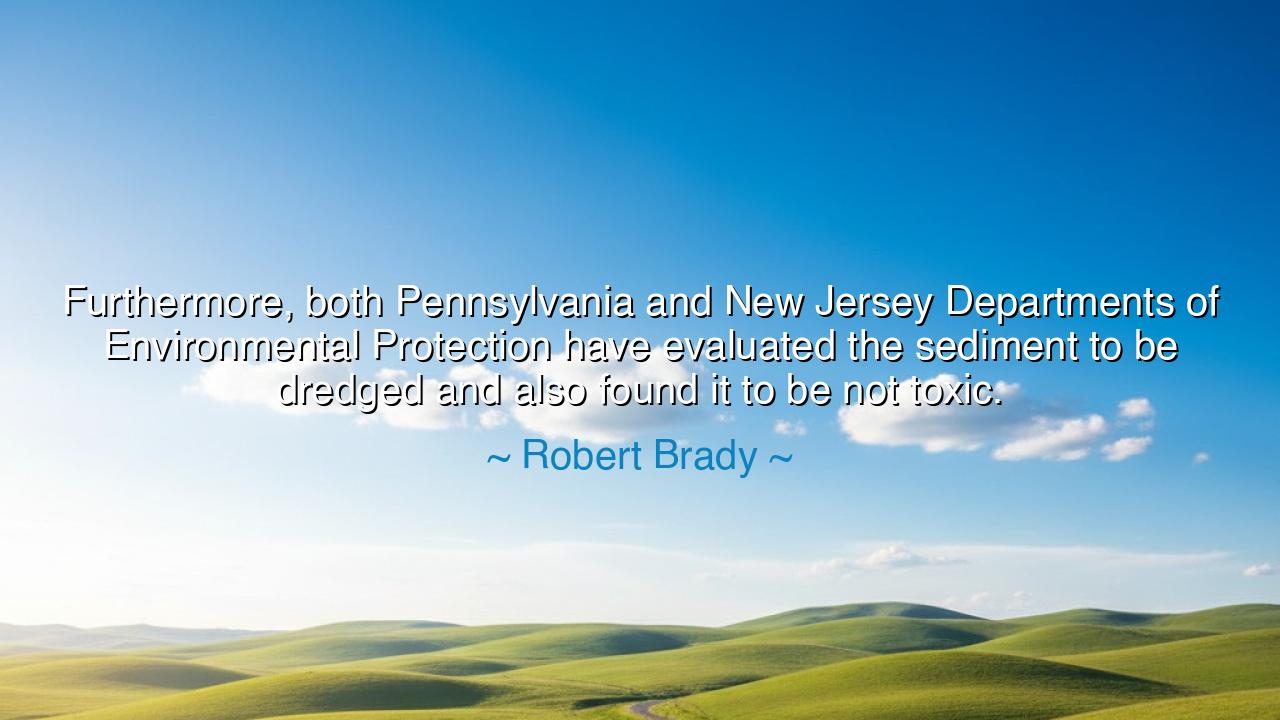
Furthermore, both Pennsylvania and New Jersey Departments of
Furthermore, both Pennsylvania and New Jersey Departments of Environmental Protection have evaluated the sediment to be dredged and also found it to be not toxic.






Robert Brady, speaking in defense of stewardship and progress, once declared: “Furthermore, both Pennsylvania and New Jersey Departments of Environmental Protection have evaluated the sediment to be dredged and also found it to be not toxic.” At first glance, his words seem technical, the language of policy and science. Yet beneath their plain surface lies a deeper truth: that the care of the earth, the judgment of what may harm and what may heal, rests not in rumor or fear, but in careful measure, in the weighing of evidence, and in the shared responsibility of those who guard the land and waters.
The meaning of this saying lies in the eternal tension between necessity and preservation. The act of dredging—to clear rivers or harbors for commerce and navigation—can stir suspicion, for the waters hide the remnants of centuries: pollution, waste, and forgotten poisons. The people fear what might be released. Brady invokes the authority of environmental protection, assuring that the sediment is not toxic, that human action will not unleash hidden ruin. His words are thus a call to trust in the balance between progress and caution, between human need and environmental safety.
The origin of this statement lies in debates over projects to deepen and clear waterways along the Delaware River, where commerce demanded passage and citizens demanded protection. Brady, as a representative, sought to affirm that the guardians of the earth—the agencies charged with testing and vigilance—had examined the matter with care. His voice stood as mediator, declaring that action need not be destruction, that the river’s flow could be shaped without poisoning its life.
History offers us parallels. Consider the Aswan High Dam in Egypt, built to tame the Nile and bring power and irrigation. It was hailed as triumph, yet it stirred also the deep sediment of the river, altering ecosystems, salting soils, and changing ancient rhythms of fertility. The lesson is clear: great works may serve mankind, but they must be measured with wisdom, lest they unleash harm unforeseen. Brady’s reassurance is born of this long history—that men have learned to test, to guard, to act with the guidance of science, so that progress may not repeat the errors of the past.
There is something deeply emotional in Brady’s words when heard with the ears of posterity. They remind us that fear can paralyze, and recklessness can destroy, but reason—applied with patience—offers a third path. By declaring the sediment safe, he affirms not only the science but also the possibility of harmony between human enterprise and the health of the earth. His statement is thus not only about a riverbed, but about the principle of discernment: that man must never act blindly, but neither should he refuse all action out of fear.
To future generations, his teaching is both warning and encouragement. The warning: never trust blindly that progress is harmless, for history shows how easily greed disguises itself as necessity. The encouragement: when men and women of integrity test, measure, and report with honesty, then progress can indeed be aligned with preservation. Thus the agencies of environmental protection are not bureaucratic obstacles, but guardians of trust, ensuring that the waters flow not with poison but with life.
The lesson for us is clear: let neither fear nor haste rule your decisions. In your own life, test the ground before you build, examine the cost before you act, and seek the counsel of knowledge before leaping into ambition. Practically, this means supporting transparent science, demanding accountability from leaders, and remembering always that nature is not an enemy to be conquered, but a partner to be respected. In this way, the rivers of the earth may continue to sustain both commerce and creation.
Thus Robert Brady’s words endure as a calm assurance: “The sediment to be dredged is not toxic.” Let us hear them not merely as a technical report, but as an emblem of how humanity must always act—with caution, with evidence, with reverence for the world entrusted to us. For only when progress is measured by wisdom will it endure as blessing, and not curse, to those who come after us.






AAdministratorAdministrator
Welcome, honored guests. Please leave a comment, we will respond soon